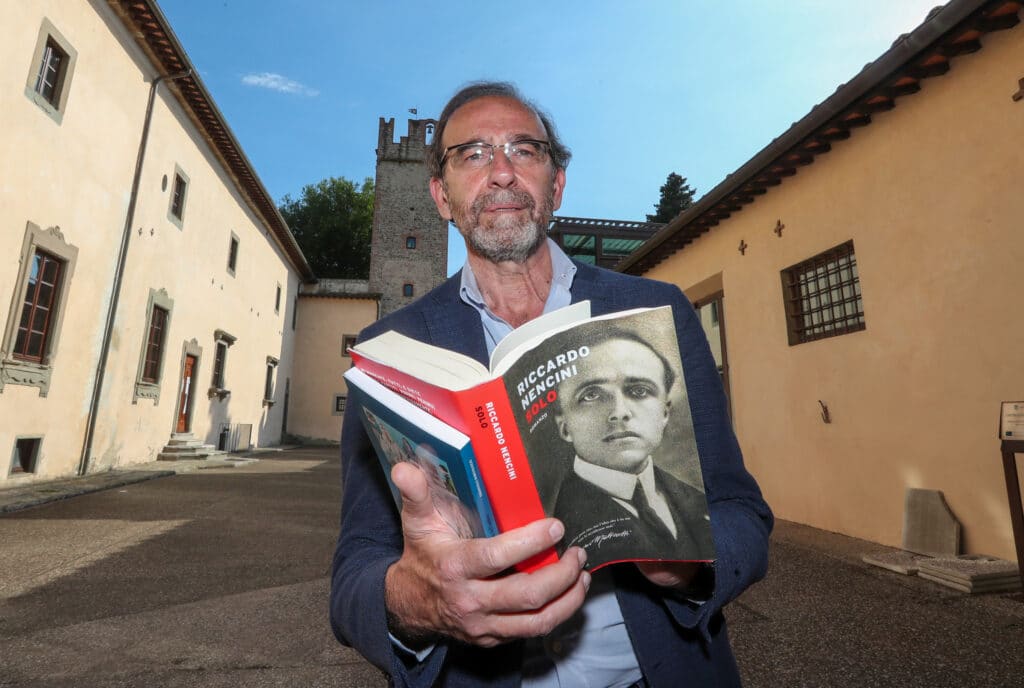
“Solo”. Perché Matteotti è stato lasciato solo. Prima, a combattere contro i brogli e le violenze fasciste, e anche dopo i tristissimi fatti che lo hanno visto sacrificare la sua vita. “Solo” (edito da Mondadori) è il nuovo libro di Riccardo Nencini, Senatore, che ci ha concesso un approfondimento sugli anni inquieti del trapasso dallo Stato Liberale al Regime, che Giacomo Matteotti, prima di tutti, da solo e contro l’opinione di molti, aveva capito. Da parte della nostra redazione un sentito ringraziamento al Senatore Nencini per la disponibilità.
Perché Matteotti è tanto interessante? Perché ancora dobbiamo studiare e contribuire a far conoscere la sua vita?
“È interessante perché è un socialista diverso. Confida molto nell’educazione e nell’elevazione del proletariato. Punta sulla formazione politica dei quadri del PSI e i risultati si vedono: 63 sindaci su 63 nel suo collegio del Polesine, sindaci che poi verranno spazzati via dall’ondata fascista. Matteotti capisce subito l’essenza vera del fascismo quando tutti sottovalutano il problema. Capisce prima di tutti che la violenza fascista era ben diversa dalle repressioni di Bava Beccaris di fine Ottocento”.
Il 10 giugno 1924, data del suo rapimento, è uno spartiacque della storia d’Italia.
“È una data significativa anche se l’Italia era già ostaggio di un regime autoritario che si stava avviando verso la dittatura, almeno dal 1923. Era già stata istituita la milizia, la polizia segreta, era attiva già la censura alla stampa”.
La violenza fascista è stata consentita o quantomeno non contrastata dalle fragili istituzioni liberali. In più di un’occasione si è ricorso allo stato d’assedio, soprattutto a livello locale, come nel caso dei moti della Lunigiana o nelle Province siciliane. Tanto rigore non si è utilizzato con il fascismo.
“Il Governo pensa di utilizzare i fascisti ma, complice la crisi dello stato liberale, il fenomeno alla fine gli scappa di mano. Mussolini non si fa mai convincere da una strada costituzionale. La domanda che dobbiamo porci è: senza la violenza, senza l’uso strategico delle bande armate il fascismo, che pure interpretava alcuni sentimenti degli italiani, sarebbe mai arrivato dove è arrivato? Avrebbe raggiunto il potere o, almeno, in così poco tempo? Il vero punto cardine di tutta la storia è capire perché scoppi e perché si diffonda lo squadrismo agrario. Perché proprio nelle campagne.
La risposta è che nelle campagne c’era già stata una rivoluzione riformista, che aveva portato risultati concreti nel miglioramento della vita dei lavoratori. Basti citare le otto ore di lavoro e l’imponibile di manodopera grazie alle leghe sindacali. Tutto questo per latifondisti e nobili agrari era un problema. Da qui dilaga il fenomeno fascista, dal 1921, quando il pericolo rosso non c’è più e in poco tempo via i patti agrari, via le leghe bracciantili, commissariati i comuni socialisti”.
Quegli anni meritano di essere studiati ancora e compresi. Ci sono aspetti, storie, personaggi, protagonisti che vorrebbe analizzare nel prossimo futuro?
“Andrebbe riscritta la storia del PCI e dei suoi protagonisti di allora perché la storia che ci è stata raccontata fino ad oggi ha troppi buchi. Dalla nostra storiografia sembra che fin dal 1919-1920 ci sia un fronte antifascista, più o meno composito. Non è vero! Prima della lotta al fascismo ciò su cui si concentrano i dirigenti del PCI è la lotta interna alla sinistra, alla sinistra riformista del PSI. È stata una lotta letale, per tutti noi. La storia è stata ricostruita e raccontata in modo volutamente sbagliato. E non lo dico io, lo dice lo stesso Mussolini. Per Mussolini l’anelito rivoluzionario dei comunisti è oro colato, i riformisti sono le “pecore rognose”. Allora il PSI esprimeva la guida della CGIL, aveva portato riforme per i lavoratori e i braccianti: era il vero nemico da abbattere”.
C’è quindi una responsabilità storica del PCI?
“Il grande errore del PCI è stato coltivare il sogno della rivoluzione e, parimenti, interpretare il fascismo come l’ultimo stadio di evoluzione del capitalismo e come l’ultima, violenta, risorsa della borghesia. Avevano sbagliato completamente le analisi. Terracini alla lunga ammetterà che aveva ragione Turati. Anche Gramsci farà autocritica.
Non possiamo dimenticare, però, quando Gramsci scrisse che era morto “il pellegrino del nulla” riferendosi a Matteotti. Questa è la storia.
E mentre Matteotti, da vivo, faceva accorati interventi contro la violenza e i brogli di Gramsci ricordiamo un solo intervento in Aula, in difesa delle libere associazioni…”
Per acquistare il libro: https://www.librimondadori.it/libri/solo-riccardo-nencini/#close-modal
Why is Matteotti so interesting? Why do we still need to study his human and political story?
“He is gripping because he is a different socialist. He has great confidence in the education and elevation of the proletariat. He focused on the political training of PSI cadres and the results were clear: 63 mayors out of 63 in his Polesine constituency, mayors who would later be swept away by the fascist wave. Matteotti immediately understood the true essence of fascism when everyone underestimated the problem. He understood before anyone else that fascist violence was quite different from the repressions of Bava Beccaris”.
June 10, 1924 is a watershed in the history of Italy.
“It is a significant date even though Italy was already hostage to an authoritarian regime that was heading towards dictatorship, at least since 1923. The militia, the secret police, and press censorship had already been established”.
Fascist violence was allowed or at least not opposed by the fragile liberal institutions. On more than one occasion, the state of siege was used. Such rigor was not used with fascism.
“The government thought of using the fascists but, complicit in the crisis of the liberal state, the phenomenon eventually got out of hand. Mussolini is never persuaded by a constitutional road. The question we must ask ourselves is: without violence, without the strategic use of armed gangs, would fascism, which also interpreted some of the sentiments of the Italians, have ever gotten where it did? Would he have achieved power or at least in such a short time? The real pivotal point of the whole story is to understand why agrarian squadrism broke out. The answer is that there had already been a reformist revolution in the countryside that had brought concrete results in improving the lives of workers. Suffice it to mention the eight hours of work and the taxable labour. All this for landowners and agrarian nobles is a problem. From here the fascist phenomenon spread, from 1921, when the red danger was no longer there and in a short time the agrarian pacts were gone, the labour leagues were gone, and the socialist municipalities were taken over”.
Those years deserve to be studied further and understood. Are there any aspects, stories, characters, protagonists that you would like to analyse soon?
“The history of the PCI and its protagonists of that time should be rewritten because the story we have been told until today has too many holes. From our historiography it seems that since 1919-1920 there has been an antifascist front, composite. Not true! Before the fight against fascism what the leaders of the PCI focused on was the internal struggle within the left, the reformist left of the PSI. It was a lethal struggle, for all of us. History was reconstructed and told in a deliberately wrong way. And I am not saying this, Mussolini himself says it. For Mussolini, the revolutionary yearning of the Communists was gold, the reformists were the “mangy sheep”. At the time, the PSI was the leader of the CGIL, it had brought reforms for workers and laborers: it was the real enemy to be put down”.
Is there therefore a historical responsibility of the PCI?
“The great mistake of the PCI was to cultivate the dream of revolution and, likewise, to interpret fascism as the last stage of evolution of capitalism and as the last resource of the bourgeoisie. They had their analyses completely wrong. Terracini would eventually admit that Turati was right. Even Gramsci will be self-critical. We cannot forget, however, when Gramsci wrote that “the pilgrim of nothingness” had died, referring to Matteotti. This is history. And while Matteotti, while alive, made heartfelt speeches against violence and fraud, by Gramsci we remember only one speech in the Chamber, in defence of free associations…”
Resta sempre aggiornato con Il Tazebao
Unisciti al gruppo Telegram per ricevere i nostri approfondimenti appena usciti. Instagram sarà il nostro supplemento fotografico. I video animano il nostro canale YouTube. Infine, inviando una mail all’indirizzo della redazione (redazione@iltazebao.com) puoi ricevere la newsletter settimanale.





